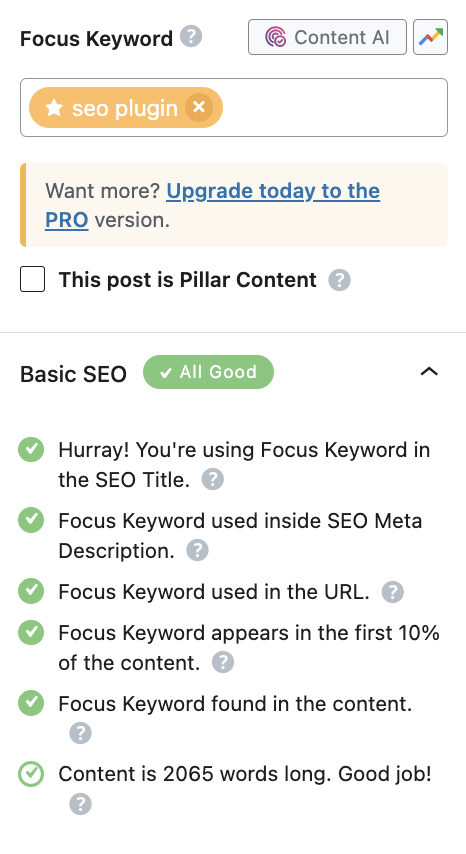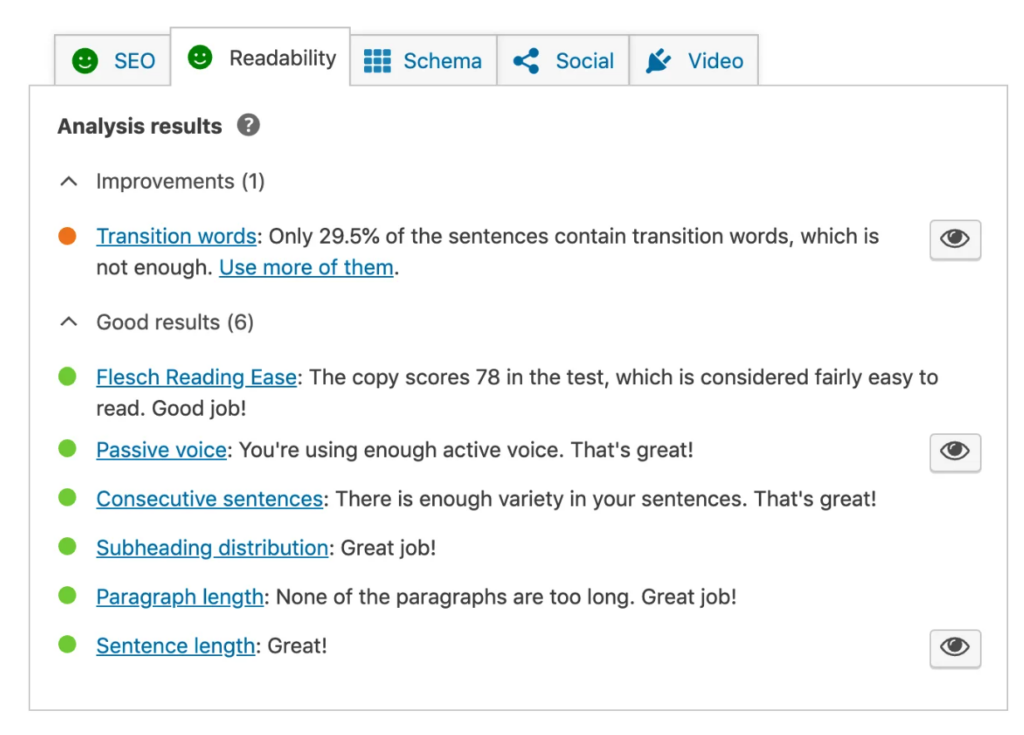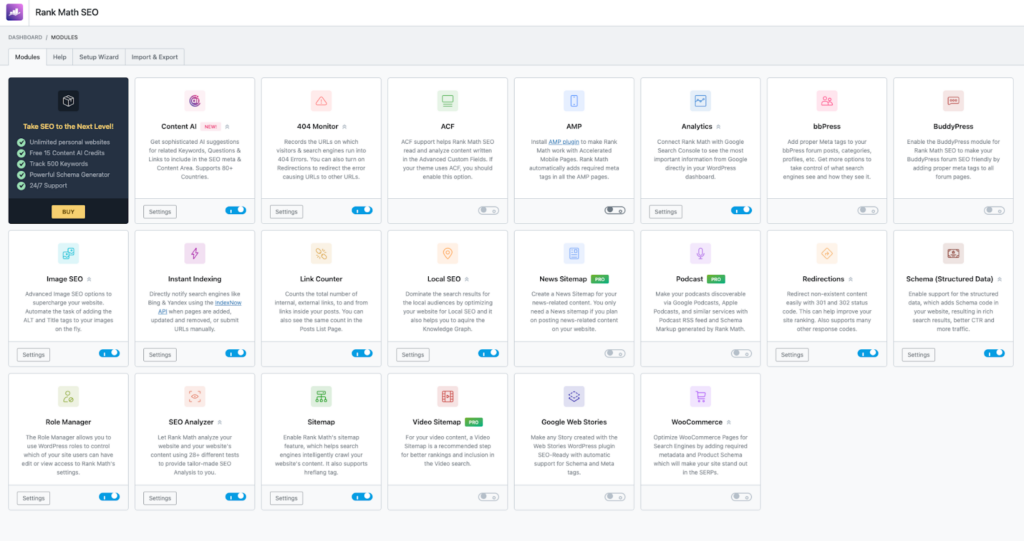In travel blogging, where every moment is a potential story, time is often scarce. Content creators are all too familiar with the grind of juggling writing, photography, social media, and sharing their adventures. This relentless pace can lead to wasted hours trying to figure it out. And don’t get us started with understanding the ins and outs of search engine optimization (SEO). It’s important, but sometimes it can be hard to implement. Here is where WordPress plugins, especially SEO plugins, are key.
What does an SEO Plugin do?
An SEO plugin is essential for optimizing WordPress websites and blog articles. It addresses the technical and content-related aspects required to improve search engine rankings. At its core, an SEO plugin helps in:
- Keyword Optimization: It guides content creators on where and how to use relevant keywords within their posts and pages, enhancing their visibility for those terms in search engine results.
- Meta Data Management: The plugin simplifies editing meta titles and descriptions, which are critical for click-through rates from search results. It ensures these elements are optimized for both search engines and potential readers.
- Content Analysis: By evaluating readability and content structure, it helps make the text more user-friendly, potentially reducing bounce rates and improving the time spent on the site.
- Sitemap Creation: Automatically generates and updates XML sitemaps, making it easier for search engines to crawl and index the website’s content efficiently.
- Social Media Integration: Facilitates the integration of social metadata to improve how content is shared and presented on social platforms.
- Technical SEO Improvements: Some plugins offer solutions for more technical aspects of SEO, such as creating proper canonical tags to avoid duplicate content issues, managing 301 redirects, and optimizing site speed.
By streamlining these processes, an SEO plugin removes the complexity of site optimization, eliminating the guesswork needed to get your article on the first page of Google.
Best WordPress Plugins for SEO: Rank Math or Yoast?
Now that we’ve convinced you of the importance of SEO plugins, you’re probably wondering which is the best. Two plugins stand out for optimizing WordPress sites for search engines: Rank Math and Yoast SEO.
Both plugins are beloved in the digital marketing community for their comprehensive features that streamline SEO tasks, making it easier for website owners to optimize their content and improve their search engine rankings.
So, Rank Math vs Yoast, which is better? Let’s take a look.
Rank Math SEO Plugin to Optimize Your WordPress Content Easily
Rank Math comes from the team behind MyThemeShop, a renowned WordPress theme and plugin provider. According to WordPress.org, the plugin boasts over a million active installations, a testament to its growing popularity and effectiveness.
Rank Math is admired for its comprehensive suite of features, which includes:
- Advanced analytics with Google Search Console integration.
- Over 840 schema types are supported.
- Sitemap and image SEO automation.
- User-friendly for both beginners and experts.
- Local SEO
- Robust support for WooCommerce sites.
Rank Math’s user-friendly interface and deep customization options make it a powerful tool for optimizing WordPress content.
Boost Website Visibility Easily with Yoast SEO Plugin
Yoast SEO, developed by Joost de Valk and his team, is trusted in the WordPress community and recognized for its solid SEO tools and user-centric design. Like Rank Math, Yoast SEO is widely used, with millions of downloads, indicating its reliability and effectiveness in the SEO space.
Yoast is known for its comprehensive set of features, which includes:
- Detailed readability analysis for content optimization.
- Intuitive traffic light system for on-page SEO status,
- Comprehensive SEO and content analysis tools.
- Robust XML sitemap functionality.
- Long-standing reputation and wide user base.
Yoast is known for its focus on sustainable SEO practices, ensuring that websites remain optimized according to the latest standards.
Rank Math vs. Yoast: An Overview
| Feature | Rank Math | Yoast SEO |
| User Interface | Modern and intuitive dashboard with a sidebar panel. Two modes: easy and advanced. | Traditional dashboard, straightforward and familiar to many users. |
| SEO Analysis | Score out of 100 with detailed optimization suggestions. Includes readability within the overall score. | Traffic light system for SEO and separate readability analysis with detailed improvement tips. |
| Keyword Optimization | One keyword per page/post; up to 5 site keywords included in free account. | One keyword per page/post. Multiple keyword analysis available in the premium version. |
| Schema Markup | Advanced schema generator with custom options. More types of schema available for free. | Basic schema options with less customization in the free version. |
| Social Media Integration | Configurable directly in the post editor for various platforms. | Configurable in both the post editor and the dashboard settings. |
| Content Readability | Offers basic readability tips within the SEO score. | Comprehensive readability analysis using Flesch-Kincaid and other tests, including a separate score. |
| SEO Tools and Features | Provides a broad range of SEO tools for free, including Google Search Console integration, automatic canonical URLs, advanced redirects, and more. | Basic SEO tools available for free, with advanced tools like internal linking suggestions available in the premium version. |
| Pricing for Premium Features | More affordable with a single premium plugin supporting unlimited websites. Free version includes many premium-like features. | Core premium plugin and additional add-ons for specific SEO enhancements, with strict site limits for paid plans. |
| Global SEO Options | Extensive global SEO settings for various content types and site builders in the free version. | Limited global SEO options in the free version; advanced settings require premium. |
| Website Performance | Claims to be lighter and faster due to a modular approach. | Well-established but may not offer as lightweight a solution as Rank Math. |
| Popularity and User Ratings | Rapidly growing user base with high ratings. | Most popular SEO plugin with a long history and slightly lower but still high ratings. |
Keyword optimization
Yoast SEO’s free version helps users optimize their content for a single focus keyword or keyphrase per page or post, emphasizing the importance of using that keyword naturally within the content, title, meta description, and URL.
Yoast provides real-time feedback on keyword distribution, suggesting improvements to ensure the keyword is adequately represented throughout the content. Users must upgrade to the premium version for more comprehensive keyword optimization, such as targeting multiple keywords.
Yoast does have SEMrush integration in the plugin, which will give you ideas for additional keywords from the SEMrush database.
Rank Math, on the other hand, takes a more generous approach in its free version, allowing users to optimize their content for up to five focus keywords. This capability enables a more nuanced and comprehensive optimization strategy, targeting a broader range of keywords and phrases without additional cost.
Rank Math provides detailed suggestions on improving keyword usage across various content elements, enhancing the potential for higher search engine rankings.

🏆 Winner: Both
Rank Math allows optimizing content for more keywords without needing a premium upgrade. Rank Math stands out as the clear winner in keyword optimization. Although Yoast isn’t bad at all and offers several keyword optimization tools.
Content optimization
Yoast SEO excels in content optimization through its advanced readability analysis. It uses the Flesch-Kincaid Reading Ease test, among other metrics, to evaluate the readability of the content, offering a separate readability score from the overall SEO score.
This differentiation allows users to focus on improving content readability, which is crucial for user engagement and SEO. Yoast provides actionable advice on sentence length, passive voice usage, transition words, and more, making it a robust tool for enhancing content quality.

Furthermore, Yoast’s inclusive language feature analyzes content for inclusivity across various dimensions, adding another layer of content optimization. Plus, Yoast SEO is functional in 27 different languages.
Rank Math integrates content optimization into its overall SEO analysis, providing a score encompassing both SEO and readability factors. While it offers suggestions for improving content’s SEO aspects, its readability analysis is not as detailed as Yoast’s.
Rank Math focuses more on keyword usage, meta information, and technical SEO settings, providing a holistic view of content optimization but with less emphasis on the readability and stylistic aspects of the content.
🏆 Winner: Yoast SEO
Yoast SEO is the superior choice for content optimization for its detailed readability analysis, separate readability scoring, and actionable insights to improve content quality and user experience.
SEO options
Yoast SEO offers a solid foundation of SEO tools even in its free version, including basic on-page SEO analysis, XML sitemaps, and meta tags editing. Its premium version expands these capabilities with features like internal linking suggestions, content insights, and redirect management. Yoast’s user-friendly approach makes it a go-to for users, prioritizing ease of use and fundamental SEO needs.
Rank Math steps up the game by offering a wide array of SEO features for free, including advanced schema markup, keyword rank tracking, and Google Analytics integration. Its modular approach allows users to activate or deactivate specific features according to their needs, making it highly customizable.

Rank Math provides an impressive suite of options for users seeking deeper SEO analysis and a broader range of tools without investing in a premium version.
🏆 Winner: Rank Math
For its extensive list of free features and greater customization options, Rank Math is the choice for users looking for comprehensive SEO tools without additional costs.
AI features
Yoast SEO has introduced AI features to some extent, like the beta version of its AI content analysis tool for generating optimized titles and meta descriptions. This addition aims to streamline the optimization process, although its AI capabilities are still in the early stages and are more limited in scope.
Conversely, Rank Math extensively embraces AI technology with its Content AI feature. This feature assists users in optimizing content for SEO by providing suggestions on focus keywords, content length, and other essential elements. This tool is part of Rank Math’s premium offering, emphasizing its commitment to integrating advanced technology for content optimization.
Although this is a premium feature, if you sign up with Rank Math, you are offered a couple of credits for free to try it out.

🏆 Winner: Rank Math
Rank Math takes the lead in AI features with its more developed and integrated Content AI tool, offering users advanced assistance in content optimization.
Pricing
Yoast SEO’s free version covers the basics of SEO. Its premium version, priced at $99/year for each site, offers advanced features like multiple keyword optimization and internal link suggestions. Additional plugins for niche SEO needs come at extra costs, potentially increasing the investment for comprehensive coverage.
Rank Math differentiates itself with a highly competitive pricing model. Its free version includes many features that Yoast reserves for its premium users. The Pro version of Rank Math costs $59/year and covers unlimited personal sites. It offers a broader set of features than Yoast’s premium version, making it a more budget-friendly option for users managing multiple sites or seeking extensive SEO tools.
🏆 Winner: Rank Math
Rank Math offers a more affordable solution with its lower pricing for the premium version and a broader range of features available for free, presenting better value for users at different levels of SEO expertise.
Yoast vs. Rank Math: Which should you use?
So, now that we’ve broken down each plugin, are you still a little confused? Don’t worry; let’s break it down even further. You should use:
✅ Yoast
Choose Yoast SEO if content quality and readability are important to your SEO strategy. It’s ideal for those valuing a plugin with a long-standing reputation and focusing on user-friendly insights for optimizing content. Yoast’s detailed readability analysis and its structured approach to SEO make it suitable for beginners and those willing to invest in premium features for comprehensive management across various SEO needs.
✅ RankMath
Opt for Rank Math if you’re looking for extensive SEO tools and features without the premium price tag. It’s perfect for users needing advanced options like keyword rank tracking and schema markup right out of the box. With its modular design and competitive pricing for premium versions, Rank Math caters to novice and experienced users looking for a customizable and budget-friendly SEO solution.
The Verdict from Travel Bloggers: Insights and Experiences
But what do the travel bloggers and content creators have to say? What tool are they using, and which one do they love the best? Well, RankMath is a clear winner, although some people still prefer Yoast.

Louise Joy, Formidable Joy:
“I’ve just started using RankMath for my new niche travel website. I’ve been using Yoast for so long on my main blog, so I thought it would be interesting to try a different tool with this one. I’m still getting used to using it, but I’m struggling to get a good score via RankMath. Posts that were previously optimised perfectly according to Yoast (I started off with Yoast on this site before swapping to RankMath) are now low score.
The main issues I’ve found is the tool not recognising when I use my keyword(s)/keyphrtases in headers, even when I am. It also gives me a low score for keyword dentisity, but in my eyes, if I add the keyword anymore, I’ll definitely be keyword stuffing.
I’m also getting a low score for not including my exact keyphrase in the URL, but I’ve always been taught to omit filler words like ‘and’, ‘at’ etc in the URL.
And, finally, it penalises me for not using the exact keyphrase or keywords in my image alt text either. But also, with my own knowledge of SEO, I know that alt text is there to describe the image for visually impaired users, not as a way to include keywords (unless you can do it naturally, of course).
So in this case, I’ve struggled to understand the best practice. I do know that SEO tools are only supposed to be used as a general guide and that for factors like keyword dentisty, they will literally count keyword use based on text length and not take into account things like keyword stuffing or how natural the text sounds. But I’m also really keen to get a high/green score for consistency, if even so I can scroll through my posts at a glance and recognise which ones need further work.”
Lena Mrowka, Not Another Backpacker:
“I have used both tools for different clients and I like Rank Math more. Particularly, because you can enter up to five keywords in the free version vs you can only enter one keyword to focus on in Yoast’s free version. If you want to try it out, you can install Rank Math (before deleting Yoast). There is a way to transfer all data from Yoast automatically to Rank Math, so that your keywords, slugs, meta descriptions, etc. from Yoast are saved. Another reason I can think of why I prefer Rank Math over Yoast is keyword stuffing. I feel like Yoast overoptimizes for keywords and I feel more inclined to keyword stuff when I use Yoast than when using Rank Math.”


Marya Sutimi, BeauTraveler:
“I switched to RankMath at some point, I’ve lost a lot of posts that ranked well when I used Yoast. And I find Yoast performs better for search engines other than Google. Back then I occasionally got traffic from Bing etc. Never had it since I started using RankMath. I don’t switch back just because I have no time to set up everything again. I think compared to Yoast, RankMath has a better user-friendly interface and experience, which makes it look pretty seamless. I think in terms of user experience, I like RankMath better.”
Final Thoughts: Rank Math vs. Yoast
In the debate surrounding Rank Math vs Yoast SEO, the ultimate choice heavily depends on your specific SEO requirements and preferences, which highlights the importance of research, knowledge, and the details of each plugin’s modules.
Yoast SEO is known for its user-friendly interface, content analysis, and readability scoring. It’s ideal for those who place a high value on content quality and user experience, emphasizing the importance of security and the promotion of registered content.
On the other hand, Rank Math offers a comprehensive set of advanced SEO features at no extra cost, appealing to users who seek a wide array of SEO tools without needing premium pricing, demonstrating how to use them productively.
Deciding between Yoast SEO and Rank Math doesn’t have to be an either/or proposition; it’s about aligning the plugin’s capabilities with your SEO strategy’s goals. Whether you value detailed content analysis and readability insights or require a broad spectrum of SEO tools on a budget, both plugins offer great advantages to enhance your website’s search engine visibility.
So what do you think? Are you team Rank Math or team Yoast?




